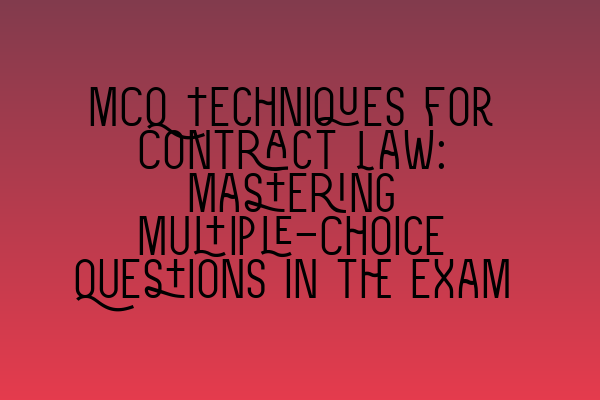MCQ Techniques for Contract Law: Mastering Multiple-Choice Questions in the Exam
Are you studying contract law and preparing for an upcoming exam? Multiple-choice questions (MCQs) are a common format used to test your knowledge and understanding of the subject. However, answering MCQs can be a tricky task, as you need to choose the correct option from a set of alternatives. In this blog post, we will explore some effective techniques to help you master MCQs in contract law and improve your chances of success in the exam.
1. Read the question carefully
One of the most crucial steps in tackling MCQs is to read the question carefully. Pay close attention to the details provided and identify the main issue at hand. Consider the parties involved, the facts of the case, and any relevant legal principles or rules. This will help you understand what the question is asking and enable you to eliminate irrelevant options.
2. Identify the key terms
Once you have read the question, identify any key terms or phrases that are central to the issue at hand. Familiarize yourself with their meanings and how they are applied in the context of contract law. This will aid your understanding of the question and guide you towards the correct answer.
3. Eliminate incorrect options
When faced with a set of alternatives, eliminate any options that you know are incorrect. This can be done by applying your knowledge of contract law and reasoning. Start by ruling out options that are factually incorrect or inconsistent with the circumstances of the case. Narrowing down your choices will increase your chances of selecting the correct answer.
4. Apply legal principles
Contract law is governed by various legal principles and rules. When answering MCQs, apply these principles to analyze the situation and determine the best course of action. Consider the elements of a valid contract, the requirements for formation, and the consequences of breach. By applying your knowledge of contract law, you can make informed decisions and select the most appropriate option.
5. Consider exceptions and nuances
Contract law is filled with exceptions and nuances that may affect the outcome of a case. Be aware of these exceptions and consider their relevance to the question at hand. This demonstrates a deeper understanding of the subject matter and allows you to evaluate options more effectively.
6. Manage your time wisely
Time management is critical when dealing with MCQs. Each question carries a certain weight, so allocate your time accordingly. If you are unsure about a particular question, make an educated guess and move on. Focus on answering the easier questions first, as this will maximize your chances of scoring points.
7. Practice, practice, practice
The key to mastering MCQs in contract law is practice. Make use of past exam papers and practice questions to familiarize yourself with the format and types of questions that may be asked. This will not only improve your knowledge and understanding of contract law but also enhance your ability to select the correct answers.
In conclusion, mastering MCQs in contract law requires a combination of careful reading, applying legal principles, and critical thinking. By following these techniques and practicing regularly, you can improve your performance in exams and increase your chances of success.
If you are interested in exploring more topics related to solicitors and the legal field, check out these articles:
– Exploring Solicitor Salaries in the UK: Average Earnings and Factors Affecting Income
– Securing Training Contracts: A Roadmap to Becoming a Solicitor
– Mentorship for Aspiring Solicitors: Nurturing Talent in the Legal Field
– Legal Challenges and Pitfalls: Navigating the Complexities of the Legal System
– The GDL (Graduate Diploma in Law): A Pathway to Becoming a Solicitor
Remember, preparing for an exam is not only about acquiring knowledge but also about developing effective strategies to approach different question types. Good luck with your contract law studies and exams!
